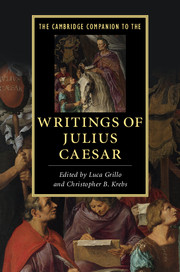Book contents
- The Cambridge Companion to the Writings of Julius Caesar
- The Cambridge Companion to the Writings of Julius Caesar
- Copyright page
- Contents
- Contributors’ Biographies
- Journal Abbreviations
- Introduction
- Part I Literature and Politics
- Part II Genre, Rhetoric, Language, and Style
- Part III Fragmentary Works
- Part IV Sources and Nachleben
- Bibliography
- Index Rerum
- Index Locorum
- Index Personarum
- Cambridge Companions to…
- References
Part II - Genre, Rhetoric, Language, and Style
Published online by Cambridge University Press: 20 December 2017
- The Cambridge Companion to the Writings of Julius Caesar
- The Cambridge Companion to the Writings of Julius Caesar
- Copyright page
- Contents
- Contributors’ Biographies
- Journal Abbreviations
- Introduction
- Part I Literature and Politics
- Part II Genre, Rhetoric, Language, and Style
- Part III Fragmentary Works
- Part IV Sources and Nachleben
- Bibliography
- Index Rerum
- Index Locorum
- Index Personarum
- Cambridge Companions to…
- References
Summary

- Type
- Chapter
- Information
- The Cambridge Companion to the Writings of Julius Caesar , pp. 95 - 170Publisher: Cambridge University PressPrint publication year: 2017
References
Further Reading and Research
The question of genre in relation to Caesar’s Commentarii is often treated implicitly within wider studies of the works as literature. Two now classic studies of these aspects of the Commentarii are Adcock (1956) and Eden (1962). Clear and engaging introductions to the works, including questions of genre, can be found in Kraus (2009), on the BG, and Raaflaub (2009), on the BC. Riggsby (2006) examines the BG in its cultural context; for the intersection of literature and politics in the BC, see Batstone and Damon (2006) and Grillo (2012). Scholarship on genre in Latin literature typically focuses on verse; readers will find a more inclusive overview in Harrison (2013). Rawson (1985) offers a comprehensive study of the intellectual culture of the late Republic. On the theories of writing literary Latin historical prose, see Garcea (2012) on De Analogia and Dugan (2005) on Cicero’s rhetorical works, and Marincola (1999) on the role of the author in ancient historiography more generally.
Caesar’s literary achievements in the Commentarii are now widely recognized and appreciated by scholars and students of Latin; it is no longer necessary to argue that the texts are more than just political propaganda. Work remains to be done, however, on whether (and in what ways) the BG and BC reflect and respond to innovations in Latin literature in the late Republic, such as the contemporary appearance of neoteric poetry. In addition, we need to study Caesar’s texts in the context of the development of Latin historiography: is their influence (in style, content, or form) detectable in Sallust, or Livy? Careful study of not just these later famous authors, but even the anonymous continuators of the BC, can shed light on the influence of Caesar’s contribution to historical literature.
Further Reading and Research
Among more recent general discussions of Caesar’s style, Pascucci (1973), von Albrecht (1989), and Hall (1998) stand out; among the older studies, Frese (1900) deserves special mention for numerous valuable observations. There is a host of Einzelstudien of the nineteenth century (mostly in Latin or German), amongst which Fischer (1853) offers the most comprehensive study (still) of Caesar’s use of cases, Hellwig (1889) surveys and documents Caesar’s penchant for pleonasm, and Lebreton (1901) details differences between Caesar’s and Cicero’s syntax. Other influential contributions to our understanding of Caesar’s style include Hermann Fränkel’s demonstration of philological interpretation (1933), continued by Gotoff (1984), Eduard Fraenkel’s Kriegsbulletin (1956), and esp. Odelman’s 1972 study of Caesar’s style administratif. Willi (2010) relates Caesar’s style to his linguistic doctrine and suggests possible philosophical underpinnings, and Gaertner and Hausburg (2013) provide copious insights on Caesar’s style in comparison to the style(s) of the authors of the corpus.
Caesar’s contribution to the formation of classical Latin is understudied. Further desiderata include an investigation of his linguistic and stylistic impact on (esp.) Roman historiography and an updated comprehensive account of his style.
Further Reading and Research
Most of the comprehensive work on speeches in the Commentarii is in German and in French. Rasmussen (1963) analyzes the speeches to track the change in style of the Commentarii; while Hyart (1954), Dangel (1995), and Utard (2004) focus on indirect speech.
An updated monograph on direct and indirect speech in Caesar is desirable. In particular, scholarship has concentrated on the evolution of speeches in the Commentarii, while the relation between speeches in Caesar and in the rich Greek and Roman historiographical tradition remains understudied. Their relation to the political and rhetorical context of the end of the Republic can also be productively reconsidered.
Further Reading and Research
Richlin (1992) provides an indispensable analysis of Roman aggressive humor. Maurach (2002) offers the only continuous treatment of humor in the Commentarii, but it is marked by subjective judgments; lacking is an objective model for detecting Caesar’s wit and irony. Corbeill (1996) situates humor both by and against Caesar in the context of Roman ethical categories. Ruffell (2003) contains interesting observations about the audiences of invective, and particularly how public humor changed with the political transformation from Republic to principate. Additional diachronic studies of Roman humor would be welcome.
Further Reading and Research
In 1998 Kathryn Welch and Anton Powell edited a pioneering volume, Julius Caesar as Artful Reporter, which remains fundamental for looking at various literary aspects of the BG. More recently, Riggsby (2006) and Kraus (2005a, 2009, 2010 and 2013) have made important contributions. The monographs by Batstone and Damon (2006) and Grillo (2012) focus on the BC, but their approach to Caesar’s narrative strategies is relevant to the BG as well.
Both for the BG and the BC we especially need updated commentaries with a sensitive literary treatment of Caesar as a writer. Equally desirable are monographs both on narratology and intertextuality in the Commentarii and on their relation to Greek and Latin literature, especially historiography.



